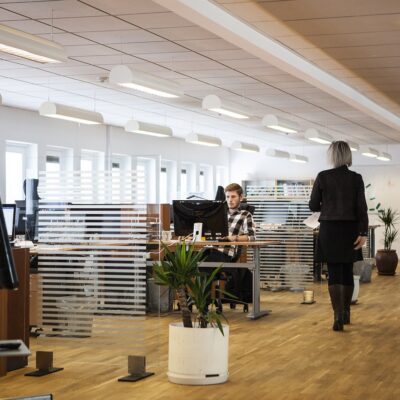Rumor has it that the office hoteling concept started in EY’s Chicago offices. As technology made it easier to manage flexible workspaces, it quickly spread worldwide.
No wonder. With many companies now using a hybrid work model, hoteling in the workplace has become a practical way to make the most of office space by letting employees book desks and meeting rooms when they need them instead of sticking to one permanent spot.
Guide to office hoteling
What is office hoteling?
Office hoteling lets you use any open workspace in your office instead of everyone having a fixed desk. It works much like booking a hotel room: employees or visitors check what’s available and choose the spot that works best for them that day. Such a system makes better use of your office space and supports a more flexible way of working.
What is the difference between hot desking and hoteling?
The difference between hoteling and hot desking isn’t huge. With desk hoteling, there are no fixed desks. Instead, people reserve a workspace — like a desk, cubicle, or private office — before they arrive. This means that when they get to the office, they already know where they will work, which helps you keep things organized.
Hot desking, on the other hand, means that employees simply choose any available spot when they arrive at the office without any reservation in advance.
As more companies adopt flexible work setups, both desk hoteling and hot desking are becoming popular choices. To run these systems smoothly, though, you may need to upgrade your booking systems — often by investing in office hoteling software (which should support hot desking, too).
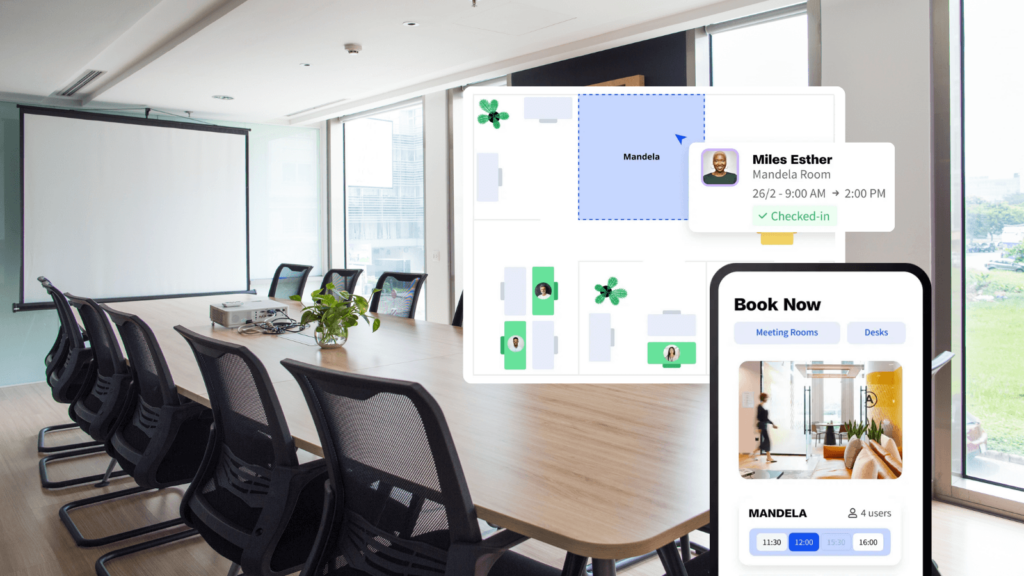
How does office hoteling work, exactly?
Office space hoteling is similar to booking a hotel room — if you have the right reservation system.
For example, an employee might ask an administrator to book a desk or room, or they can make the booking themselves using the system. Once the reservation is confirmed, the employee receives an email with all the details. When they arrive at the office, they simply check in and start working at their assigned spot.
Here’s a quick look at how it works step by step:
- An employee or office visitor wants to make a desk reservation either through an administrator or directly via the desk booking system.
- The system shows several available spaces based on their needs.
- The person picks a desk, and the reservation is confirmed.
- They receive an email with all the necessary details and the system updates with the new booking.
- When the reserved time arrives, they check in at the desk and begin their work. Simple as that.
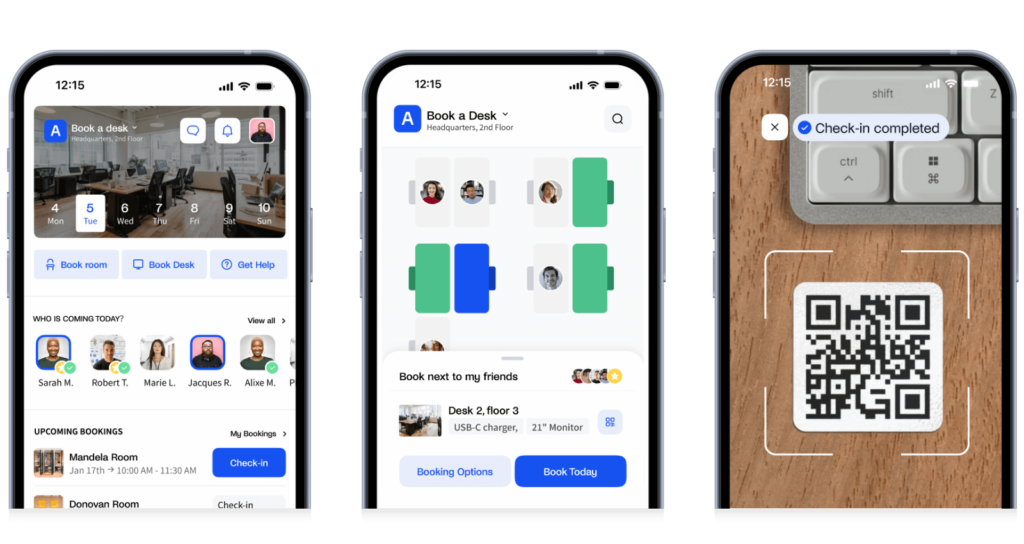
Benefits of office hoteling
- Space Optimization. The hoteling office model helps you make the most of your space. Instead of giving everyone their own permanent desk, employees book a workspace only when they need it. This means every desk or room gets used efficiently, even on days when some people work from home.
- Cost Savings. A reservation system means companies don’t have to pay for unused desks. This can reduce the overall size of the office, lowering rent and utility costs. It’s a smart way to save money and even help the environment by using less space.
- Flexibility. With office hoteling, employees can choose where and when they work based on their needs for the day. Whether they need a quiet spot to focus or a busy area for teamwork, this flexibility lets them pick the best workspace for their tasks.
- Increased productivity. When employees can choose the perfect workspace for their work, they tend to stay more focused and get more done. Picking a spot that fits their needs — whether it’s for concentration or collaboration — can boost their overall performance throughout the day.
- Team collaboration. Without fixed desks, employees can sit in different areas and meet new colleagues. This can lead to spontaneous chats, fresh ideas, and stronger teamwork, which improves the overall work atmosphere.
- Adapting to modern work trends. Office hoteling is a great fit for today’s hybrid work model, where people split their time between home and the office. It makes switching between remote work and office work easier, ensuring everyone can work comfortably and efficiently, no matter where they are.
Office hoteling challenges
Hoteling at work does come with some challenges, though:
- Coordination issues. Without a reliable booking system, you might end up with double bookings or not enough available spaces. Using advanced office space hoteling software can help keep everything organized.
- Logistical complexities. It can be tricky to ensure everyone has access to the tools and resources they need, no matter where they sit. You also need secure storage for personal items and files to keep everything safe and accessible.
- Lack of personal space. Not having a fixed desk might make some employees feel less connected to the workplace. They might miss having a personal spot they can decorate or arrange, which can impact their comfort and productivity.
- Cultural shift. Moving away from traditional fixed desks requires a change in mindset. Leaders need to support this shift and clearly explain the new flexible approach so that everyone understands and embraces the change.
Office hoteling best practices
The good news is that these challenges can be overcome with some smart office hoteling best practices, which we’re about to discuss:
Use dedicated software
Invest in good office hoteling software that centralizes all booking and office management tasks. Look for a system that’s simple to use and can handle reservations, changes, and cancellations without hassle.
For example, tools like Archie show real-time availability with interactive maps so employees can see which desks are free and where their coworkers are sitting. It should also work well with your email, chat, and other office tools, plus have a mobile app for booking on the go.
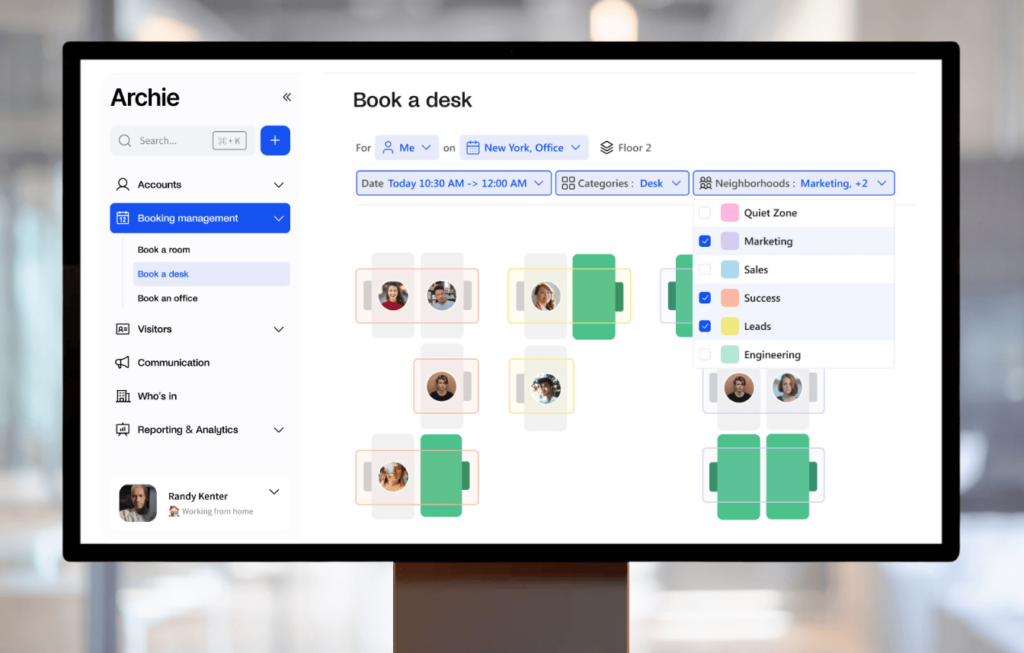
Set up a simple booking process
Once you have the software in place, create a straightforward process for booking workspaces. Employees should book a desk before they arrive, check in when they get to the office, and then check out when they leave.
Make sure everyone knows the steps through clear instructions, whether it’s via hands-on sessions, video tutorials, or easy-to-read guides. When employees understand how to use the system and know who to contact if they need help, they’ll feel more comfortable with the new setup.
Rethink your office design
Design your workspace so it can easily adapt to different needs. This means having adjustable desks, open areas for collaboration, quiet zones for focused work, and modern meeting rooms.
Since employees won’t have a permanent desk, provide secure storage options like lockers or mobile storage units. This way, everyone can keep their personal items and work materials safe, even without a fixed spot.
Make your office easy to navigate
Use digital floor plans or wayfinding tools to show exactly where each desk is located. Label all workstations in a consistent way — whether you use numbers, letters, or names based on departments — so that everyone can easily find their reserved space. Include these details in reservation confirmation emails along with a link to your office layout and clear directions for finding desks.
Set clear office hoteling guidelines and policies
Establish simple office hoteling rules for how to use the booking system. Explain how to book a desk, what the cancellation policy is, and how to share resources fairly. Set up cleaning or “reset” procedures to ensure workspaces are neat and ready for the next user.
Encourage everyone to keep shared areas clean, keep noise levels low, and use storage options like lockers for personal items. Also, make it easy for employees to provide feedback so you can regularly review and improve the system.
If you need more office hoteling guidelines for your employees, consider following the standard office hoteling etiquette below. You can use them — along with a template — to create your own office hoteling policy.
Office hoteling etiquette
Switching to office hoteling means sharing workspaces, so it’s important that your team follows a few simple office hoteling ideas to keep everyone comfortable and productive:
- Respect reserved spaces.
Always honor the reservations you have made. If someone has booked a desk or room, don’t use it. This keeps things organized and fair for everyone. - Keep spaces clean and tidy.
After you finish using a workspace, leave it as clean as — or even cleaner than — you found it. This means throwing away any trash, cleaning up spills, and putting furniture back in its original place. A clean space benefits everyone. - Mind your noise levels.
Use headphones when listening to music or during video calls, and keep conversations at a reasonable volume. Quiet zones can be especially helpful for those who need a calm environment. - Share resources fairly.
Equipment like printers, scanners, and meeting rooms should be used responsibly. Only book them for the time you really need and follow the schedule so others get their turn, too. - Protect privacy and office security.
In a shared space, it’s important to safeguard both personal and company data. Always lock your computer screen when you step away, and don’t leave sensitive documents out in the open. Using privacy screens on your monitor can also help protect confidential information. - Secure your belongings.
Since you won’t have a fixed desk, make sure there are secure storage options like lockers or drawers where you can keep your personal items and important documents safe. - Respect personal boundaries.
Finally, be mindful of personal space. Avoid looking over someone else’s shoulder at their screen and give colleagues room during interactions. Respecting each other’s space goes a long way in creating a positive work environment.
Follow this simple office hoteling policy template to create a shared workspace that’s respectful, secure, and enjoyable for everyone. Good luck!
Office hoteling FAQ
Hoteling in an office means you don’t assign permanent desks. Instead, everyone reserves a workspace when they need one. It’s like booking a hotel room: you check what’s available, pick a spot, and use it for the day. This flexible setup makes the most of your office space and lets everyone choose the best place to work.
Yes, office hoteling does work! It lets employees book desks or workspaces ahead of time, which helps the office use its space more efficiently. Companies that use office hoteling, especially those with hybrid work setups, often find it makes things more flexible, saves money, and keeps the space well-organized. With the right booking system like Archie and clear rules, office hoteling can help you make the most of your workspace.
You should consider hoteling because it helps you make the best use of your office space. Instead of having fixed desks that sit empty when someone is working from home, employees reserve a workspace when they need it. This approach can save money, fit perfectly with flexible work schedules, and give everyone the freedom to choose the best spot for their tasks each day. In short, hoteling is a smart, modern way to run an office that benefits both the company and its people.
Office hoteling is a great way to make the most of your office space. Instead of everyone having a fixed desk, employees can choose the workspace that fits their needs each day — whether that’s a quiet spot for focused work or a lively area for teamwork. This flexible setup not only saves money by using space only when needed but also encourages employees to interact with different colleagues, sparking new ideas and better collaboration.
On the flip side, some people may miss having a personal desk to store their belongings and make their space their own. It might also take a bit of time for everyone to get used to the new way of working. Without a reliable booking system, issues like double bookings or confusion over available spaces can occur. However, with clear guidelines and good technology like Archie in place, these challenges can be managed, making office hoteling a smooth and effective way to run your workplace.
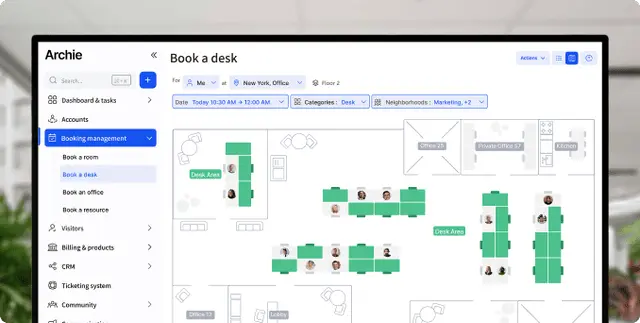
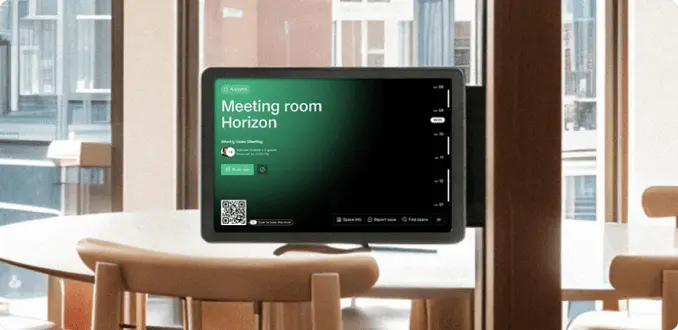
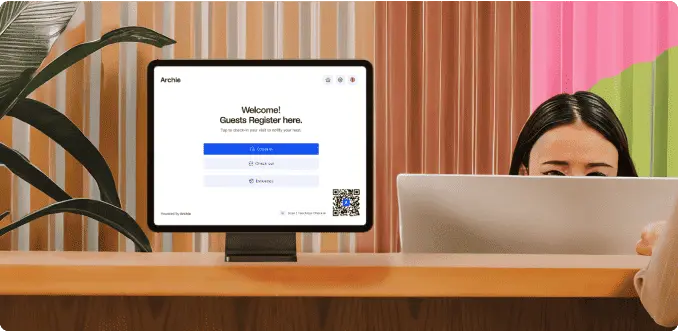
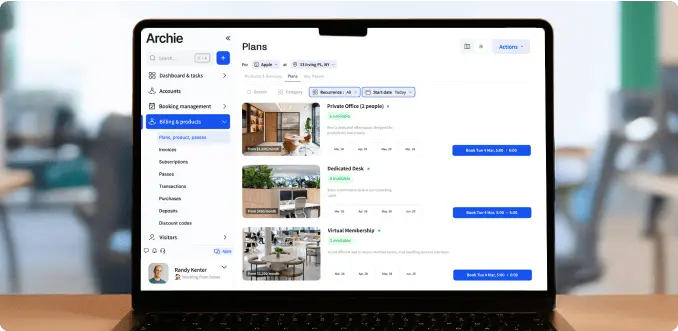
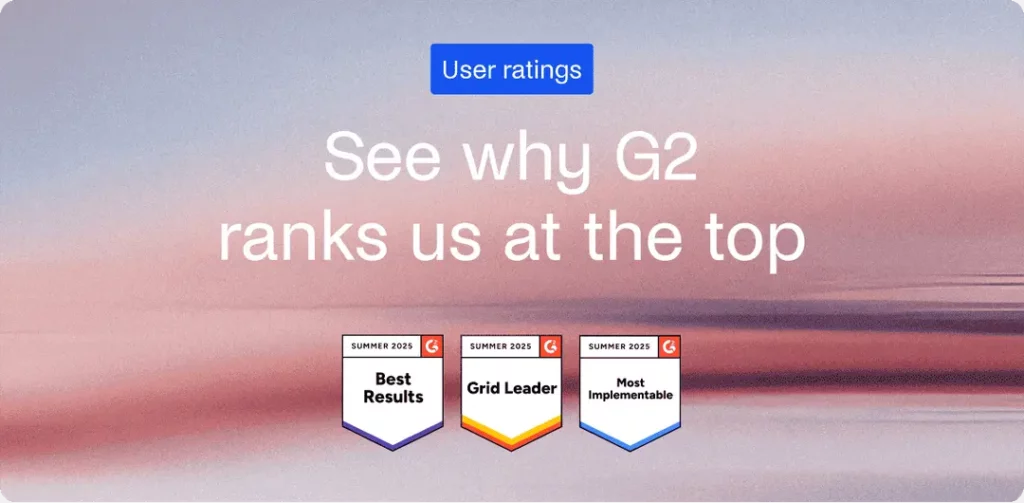
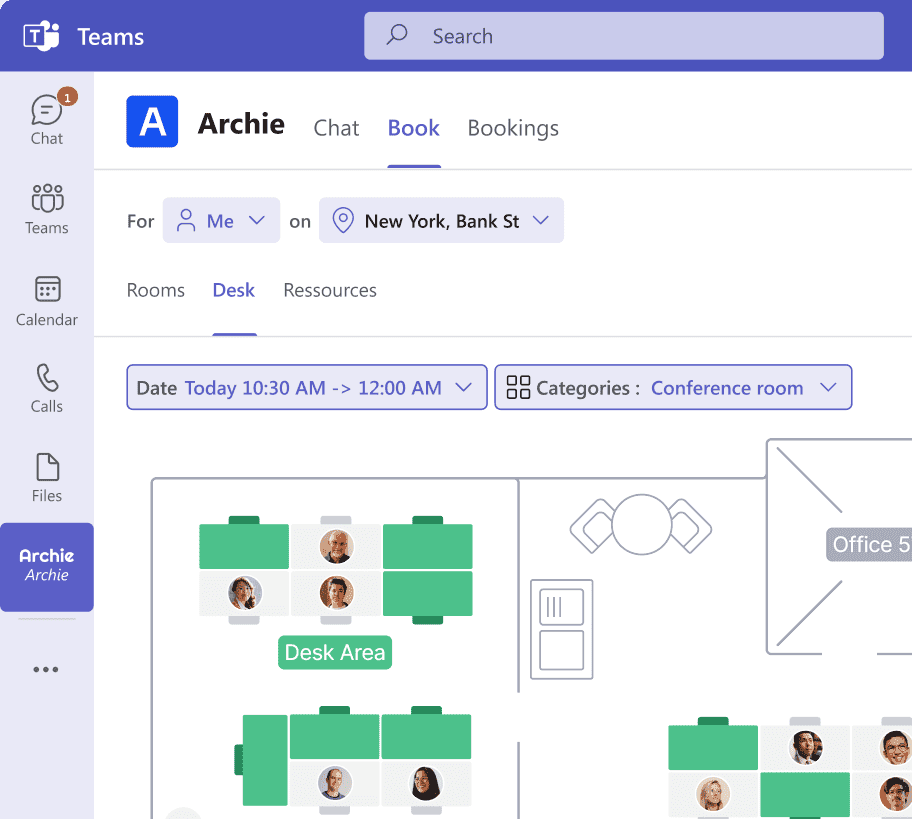
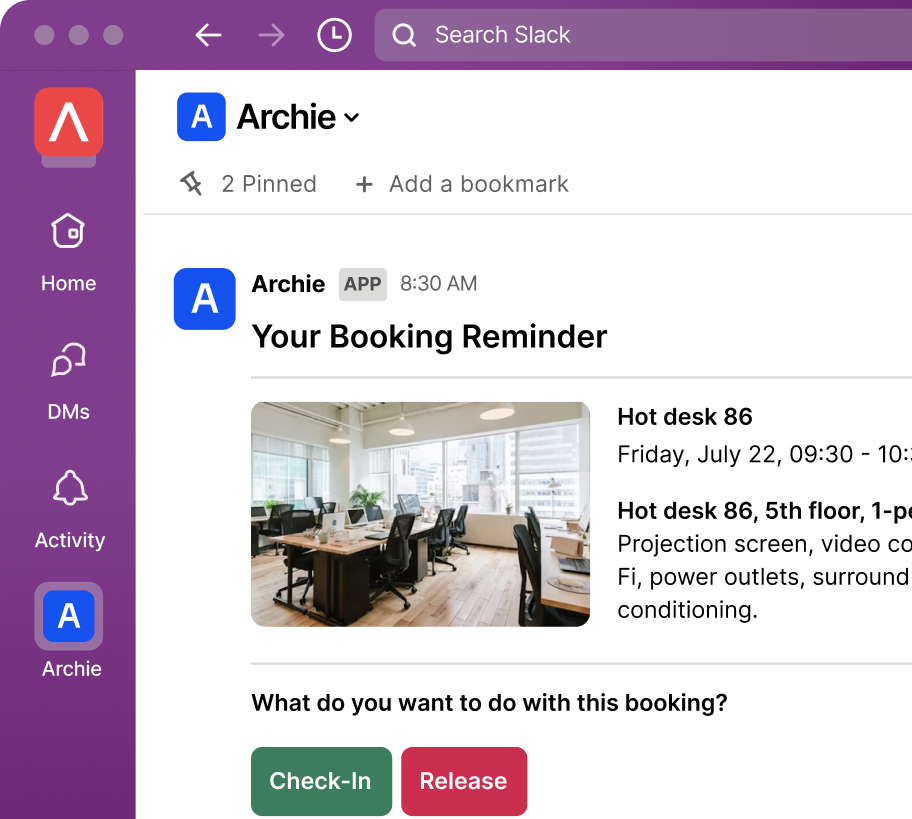
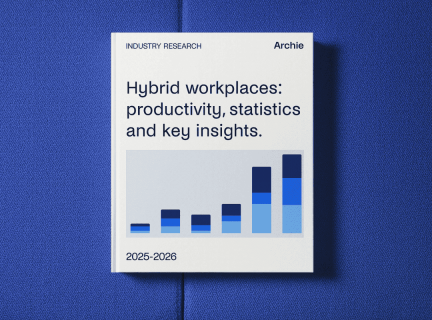
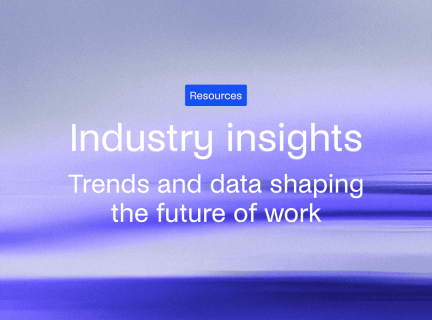
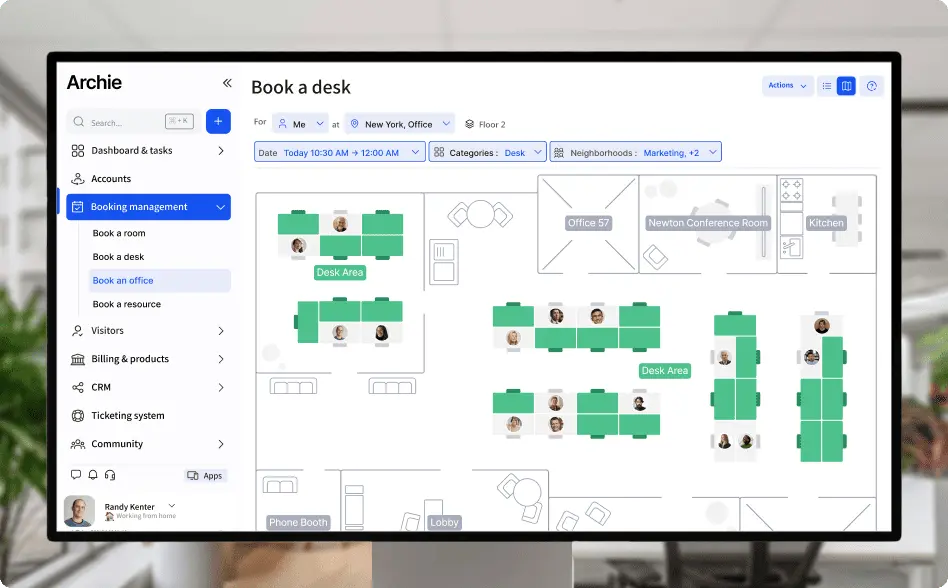
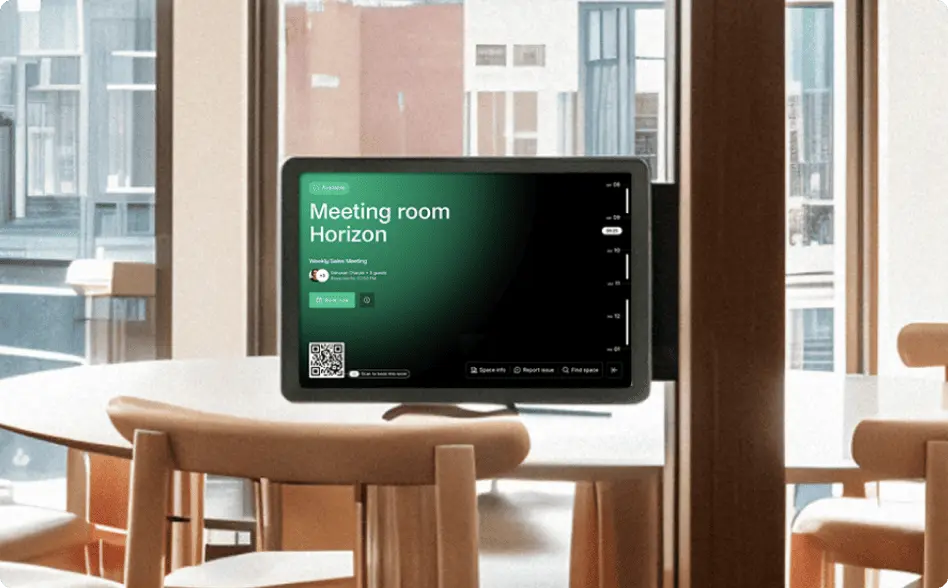
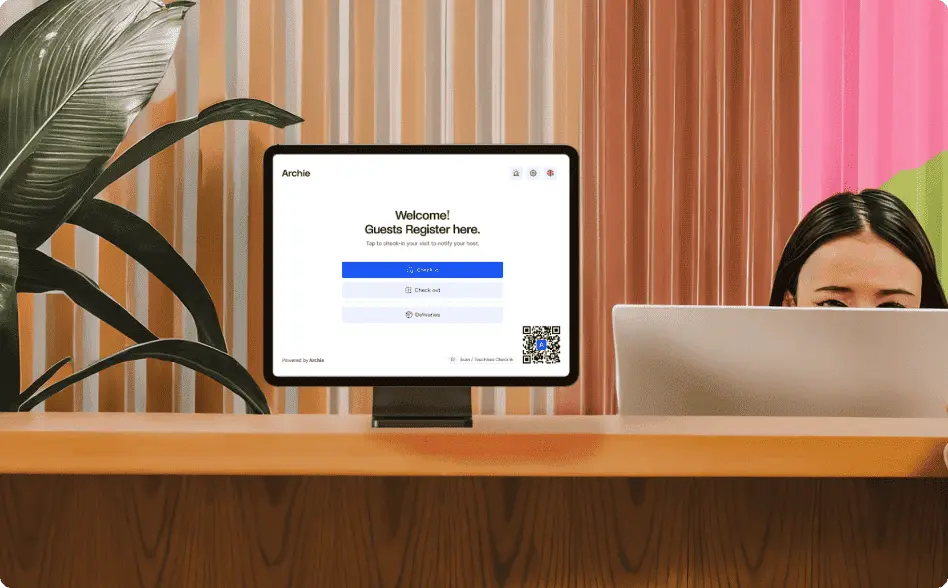
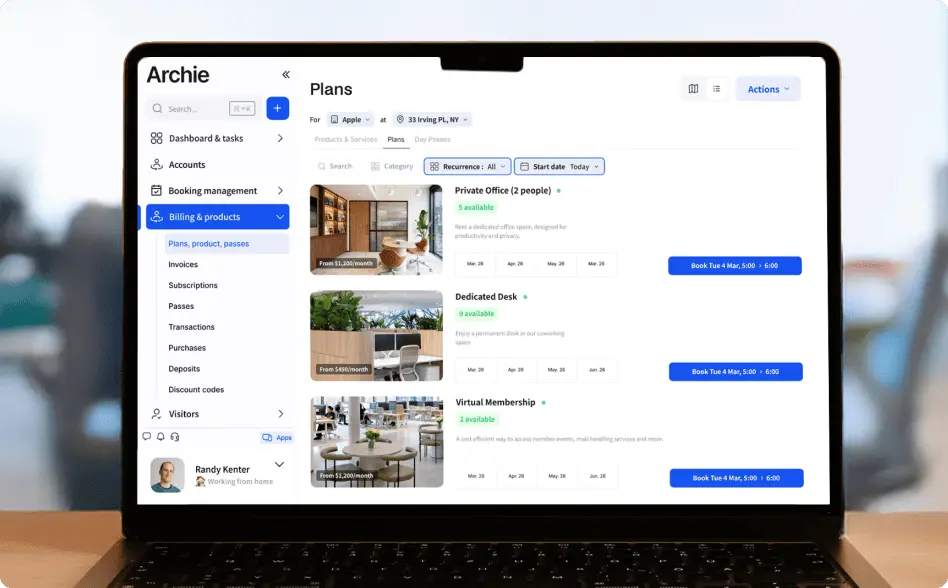




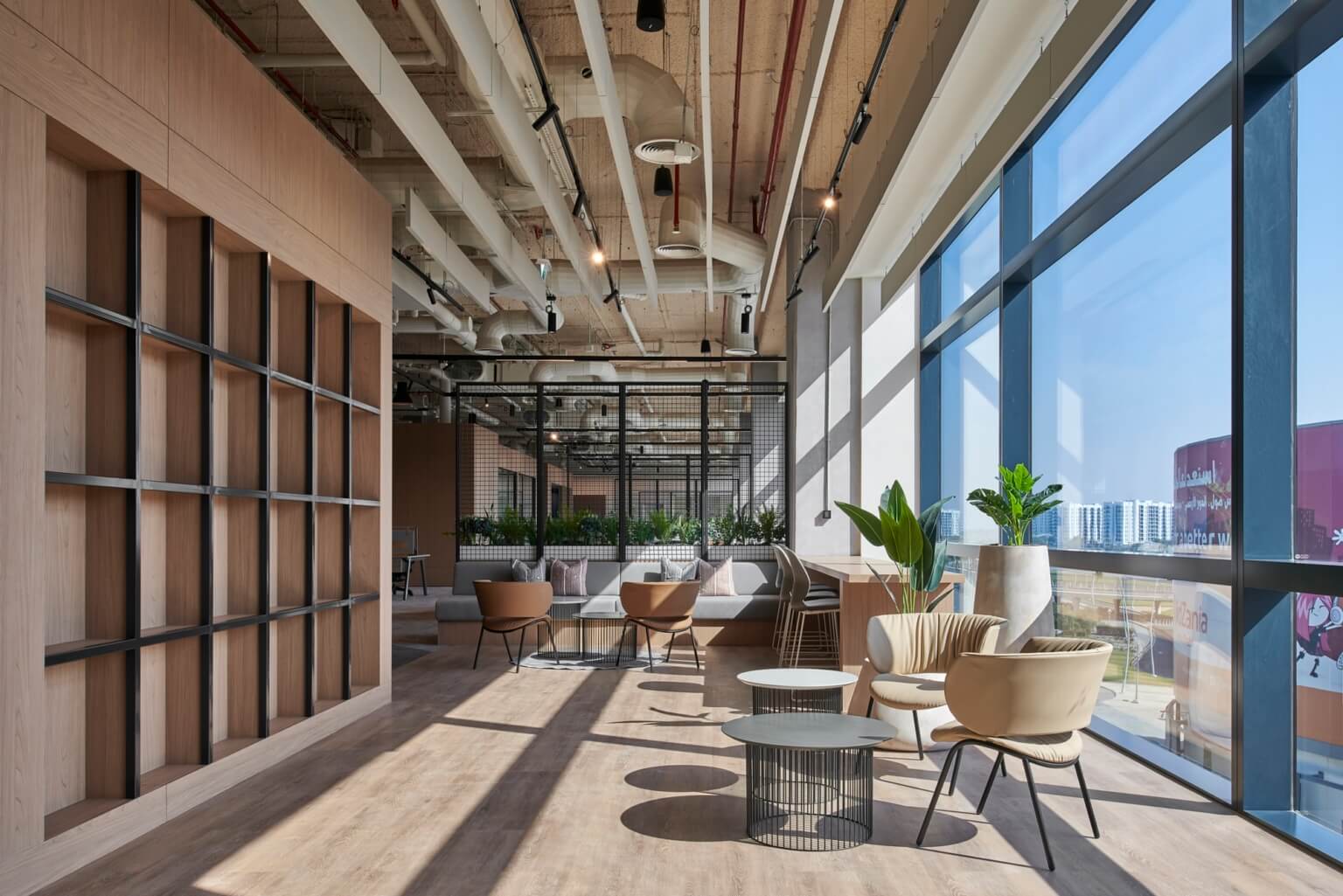
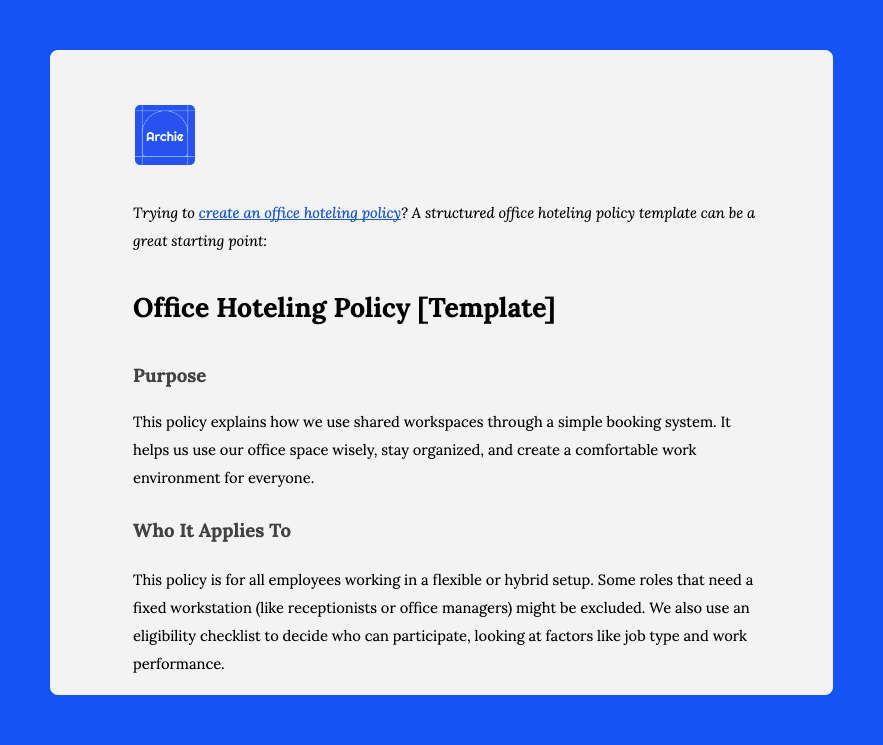
![Envoy Software Review: Features, Pricing, Pros & Cons [2026] Office space full of desks.](https://archieapp.co/blog/wp-content/uploads/2025/10/Envoy-software-overview-cover-image-400x400.jpg)
